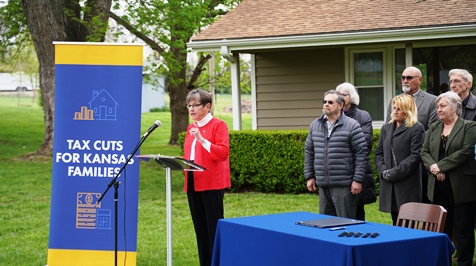Law enforcement officers are carrying out raids in Topeka on shops selling cannabis products.
by Celia Llopis-Jepsen, KCUR and Kansas News Service
The Shawnee County Sheriff’s Office won’t answer questions about how many stores it has raided, on what dates or how much it seized.
Cannabis advocacy groups in Topeka say officers seized goods from several sellers on April 20 — a date celebrated by cannabis enthusiasts — and April 28, and continued their campaign over the past few days.
The move frustrates advocates holding out hope that the Kansas Legislature will take final steps later this month to seal a deal that would legalize medical marijuana.
The raids also frustrate advocates because some cannabis products already count as legal under state law.
“This ongoing persecution of Kansas citizens, retailers, distributors and ancillary business owners is detrimental to our state and its future, and it must end,” several groups said in a collective statement.
The groups — including Kansans for Hemp, the Kansas Cannabis Chamber of Commerce and the Kansas Cannabis Coalition — urged the hundreds of shops across Kansas that sell products containing THC to ensure their goods are legal and to keep detailed documentation of their origin to gird themselves against prosecution.
THC is the key psychoactive compound in cannabis plants. Kansas law allows products with very small amounts of it. To be legal, the small amounts of THC need to come from industrial hemp plants — cannabis plants that naturally contain low levels of the stuff.
In December, Attorney General Derek Schmidt concluded these rules apply to delta-8 products, too. Delta-8 really only sells well in states like Kansas, where full-blown recreational cannabis remains illegal. It is a molecular variation on standard THC with similar psychoactive effects.
The Shawnee County Sheriff’s Office says it found stores selling illegal goods — some with standard THC and some with molecular variations. It won’t answer questions about how it determined, or will determine, which of the products broke state law. To be legal, the products must contain less than 0.3% of THC or THC variations, and the substances must come from industrial hemp plants.
Earlier this year, the Ellis County county attorney told shops selling delta-8 in Hays that they wouldn’t face prosecution if they handed the products over to police voluntarily.
That county also successfully prosecuted what may be the first criminal case in Kansas that involved delta-8. Prosecutors relied on manufacturer documentation that indicated the products contained more than 0.3% of the delta-8 THC variety.
Kansans for Hemp says it knows of at least four stores in Topeka that were visited by law enforcement last month and this month. Officers went in and confiscated goods.
Store owners were told that their products were unlawful unless the Kansas Legislature changes state law.
Thirty-seven states now allow medical marijuana, the National Conference of State Legislatures says. Eighteen of them also allow recreational use.
In its most recent annual survey of Kansas public opinion, Fort Hays State University found 70% of respondents favored legalizing marijuana so the state can tax it.
Social media posts on the Shawnee County Sheriff’s Office Facebook page normally draw few public comments. But when the agency announced that it had executed warrants against an unspecified number of shops and seized products containing THC, it attracted nearly 160 comments, almost all of which criticized the action.
“You wasted tax money on this? Low hanging fruit much?” one commenter wrote. “Aren’t there real criminals out there you should be worried about?”
Another likened the raids to a “countywide crackdown on jaywalkers.”
Celia Llopis-Jepsen reports on consumer health for the Kansas News Service. You can follow her on Twitter @celia_LJ or email her at celia (at) kcur (dot) org.
The Kansas News Service is a collaboration of KCUR, Kansas Public Radio, KMUW and High Plains Public Radio focused on health, the social determinants of health and their connection to public policy.
Kansas News Service stories and photos may be republished by news media at no cost with proper attribution and a link to ksnewsservice.org.
See more at https://www.kcur.org/news/2022-05-04/a-kansas-sheriffs-office-is-raiding-shops-that-sell-thc-and-seizing-the-products

